|
|
|
Sort Order |
|
|
|
Items / Page
|
|
|
|
|
|
|
| Srl | Item |
| 1 |
ID:
133281
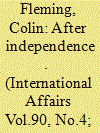

|
|
|
|
|
| Publication |
2014.
|
| Summary/Abstract |
The Scottish government's white paper on independence, Scotland's future, sets out its defence blueprint following a 'yes' vote. It makes clear that its defence plans would be subject to a Strategic Defence and Security Review in 2016, as well as negotiation on the division of assets with London. However, it also provides a strong indication of how it envisages its defence posture as an independent state-a major pillar of which is founded upon strong and continued defence cooperation with the rest of the United Kingdom. Is this a realistic assumption? And, if so, how would it work in practice? Contextualized by the increased emphasis on defence cooperation which sits at the heart of NATO's Smart Defence initiative, as well as the European Defence Agency's 'pooling and sharing' programme, the article assesses the benefits and challenges that might be encountered in a defence cooperation agreement between an independent Scotland and the rest of the United Kingdom in the event of a 'yes' vote in September's referendum.
|
|
|
|
|
|
|
|
|
|
|
|
|
|
|
|
| 2 |
ID:
155402
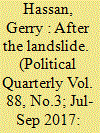

|
|
|
|
|
| Summary/Abstract |
The pre-election conventional wisdom about Scotland (both inside the country and even more in the rest of the UK) was that the SNP seemed to carry all before it. A little less impressively than previously, but the party still dictated the debate and shaped the political terrain, and had an aura of invincibility along with an inevitability about Scottish independence.
|
|
|
|
|
|
|
|
|
|
|
|
|
|
|
|
| 3 |
ID:
169346
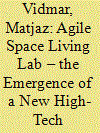

|
|
|
|
|
| Summary/Abstract |
The global space industry has recently seen a structural transformation through the emergence of ‘New Space’, i.e., a significant expansion of the development of smaller, cheaper, and more modular space-related products in services. One example of this expansion is the emergence of a world-leading cluster of New Space industry in Scotland (UK). Critically, this development is being pitched as a new approach to innovation ecosystem, which the players refer to as ‘Agile Space’, based on a consolidation of cross-sector competences within loose value chain integration. However, I argue, in particular, that the emergence of the Scottish New Space Sector is crucially linked to the Living Laboratories (Living Lab) conceptualisation of the innovation practices and processes within the Agile Space approach. Hence, this article maps the key features of the emergence and development of the New Space Industry in Scotland and analyses the key feature of the Agile Space Living Lab paradigm, before proposing a critical further research agenda suggesting several much-needed strands of enquiry.
|
|
|
|
|
|
|
|
|
|
|
|
|
|
|
|
| 4 |
ID:
138875
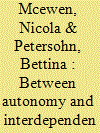

|
|
|
|
|
| Summary/Abstract |
Drawing on the distinction between self-rule and shared rule in multilevel states, this article argues that shared rule has been the neglected element of the UK devolution settlement. The ability of the devolved administrations to participate in, and influence, national decision making through shared rule mechanisms is very limited. The article argues that the lack of shared rule is especially problematic in light of the increasing complexity of the Scottish devolution settlement in the wake of the Scotland Act 2012 and the Smith commission report. Smith, in particular, seems set to increase both the power of the Scottish Parliament and its dependence on UK policy decisions in the areas of tax, welfare and the economy. Creating a more robust intergovernmental system which could manage these new interdependencies will be a significant challenge, and yet, without such a system, the new settlement will be difficult to sustain.
|
|
|
|
|
|
|
|
|
|
|
|
|
|
|
|
| 5 |
ID:
176059
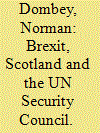

|
|
|
|
|
| Summary/Abstract |
If Scotland, spurred by Brexit, becomes independent, it is conceivable that the United Kingdom will lose its permanent seat on the UN Security Council.
|
|
|
|
|
|
|
|
|
|
|
|
|
|
|
|
| 6 |
ID:
134018
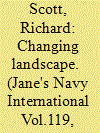

|
|
|
|
|
| Publication |
2014.
|
| Summary/Abstract |
In the run up to the Type 26 main investment decision, plans are taking shapes for a modernized complex warship capability on the Clyde. Yet there remains an element of uncertainty ahead of Scotland's referendum on independence.
|
|
|
|
|
|
|
|
|
|
|
|
|
|
|
|
| 7 |
ID:
105871
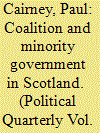

|
|
|
|
|
| Publication |
2011.
|
| Summary/Abstract |
The United Kingdom general election result in 2010 produced a hung or balanced parliament for the first time in over three decades. Since the United Kingdom has limited postwar experience of this outcome, it is natural that commentators have begun to look elsewhere for lessons on the practicalities of minority and coalition government. This article considers the lessons we can learn from the Scottish parliamentary experience since 1999. It outlines two main points of comparison: strength and stability. One might assume that coalition provides more of both than minority government. Indeed, for that reason, it is rare for central or devolved governments in the United Kingdom to operate as minorities through choice. Yet, the Scottish experience shows that the differences between coalition and minority government are not completely straightforward. Much depends on the institutional context and, in many cases, idiosyncratic elements of particular systems. Consequently, one can identify a trade-off in comparative analysis: as the identification of elements specific to one system increases, the ability to draw clear meaningful lessons decreases.
|
|
|
|
|
|
|
|
|
|
|
|
|
|
|
|
| 8 |
ID:
115099
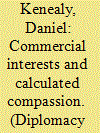

|
|
|
|
|
| Publication |
2012.
|
| Summary/Abstract |
The release of the only man convicted of the bombing of Pan-Am Flight 103 over Lockerbie, Scotland in December 1988 is the most significant diplomatic decision taken by the Scottish government. The decision constituted a two-level process: the British government's behaviour was characterised by commercial interests; and the Scottish governments by calculated compassion. Britain's policy was steered by its national interest in securing Libya's rehabilitation into international society and ensuring that British businesses could benefit. Scotland's paradiplomacy shifted from a strategy of avoidance to one using the release to further the idea of an independent Scotland. Presenting the release in such a way was to bolster the idea of Scotland as a distinct entity with its own set of values, laws, and customs and possessing an ability to operate autonomously on the international stage.
|
|
|
|
|
|
|
|
|
|
|
|
|
|
|
|
| 9 |
ID:
138885
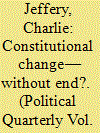

|
|
|
|
|
| Summary/Abstract |
The outcome of the Scottish independence referendum in September 2014 confirmed Scotland's continuing membership of the UK—at least for the time being. It did not take long for some who had campaigned for Scottish independence to begin envisaging a second referendum. Indeed, in early 2015 all the political momentum in Scotland appeared to be with the pro-independence Scottish National Party, which had more than tripled its membership to close to 100,000 since the referendum and had managed a smooth transition from Alex Salmond's leadership to that of Nicola Sturgeon, the new Scottish First Minister. Its main rival in Scotland, the Labour party, found itself in a rather different succession debate, sparked by Johann Lamont's resignation statement complaining about the lack of autonomy given by the party at Westminster to the party in Scotland.
|
|
|
|
|
|
|
|
|
|
|
|
|
|
|
|
| 10 |
ID:
190913
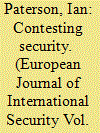

|
|
|
|
|
| Summary/Abstract |
The security-migration nexus is ubiquitous throughout Europe and beyond. An avalanche of scholarship has explored the construction of migration as a security threat in general and, in the UK, the creation of the ‘hostile environment’ in particular – the problematic nature of each being well documented. Yet, far less attention has been paid to activities that contest this process. Deploying Balzacq's four modalities of contestation – desecuritisation, resistance, emancipation, and resilience – this article addresses the imbalance, exploring how asylum and refugee sector NGOs engage in and contest security-migration politics. Using Scotland (2018–19) as an illustrative case and analysing discursive and predominantly non-discursive activities, findings demonstrate that NGOs are successfully contesting the security-migration nexus in Scotland across four principal categories, supporting the ‘surviving’ and ‘thriving’ of asylum seeker and refugee communities, problematising previous conceptualisations of ‘UK’ asylum and refugee politics, with implications extending globally. The article helps refine the theorisation of contestation, demonstrating first, the need to move beyond studies of ‘desecuritisation’, with consequences for understandings of ‘success’ in securitisation, and second, the potential blindness of single-modality studies to vital, meaningful contestation, resulting in the production of less comprehensive visions of the security world.
|
|
|
|
|
|
|
|
|
|
|
|
|
|
|
|
| 11 |
ID:
104436
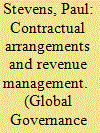

|
|
|
| 12 |
ID:
131131
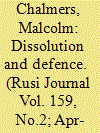

|
|
|
|
|
| Publication |
2014.
|
| Summary/Abstract |
A Yes vote in the September referendum on Scotland's independence would have considerable consequences for the armed forces, both in the rest of the UK and in the newly independent state. Malcolm Chalmers analyses recent developments in the Scottish defence debate, assessing issues such as the proposed size of the armed forces, budgets, timelines, and the prospects for the defence industry.
|
|
|
|
|
|
|
|
|
|
|
|
|
|
|
|
| 13 |
ID:
172396
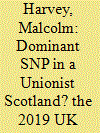

|
|
|
|
|
| Summary/Abstract |
The UK general election in December 2019 produced a resounding victory for Boris Johnson’s Conservatives, returning a majority government and the mandate for Brexit that he had campaigned for. The picture was less rosy for the Conservatives in Scotland, where his party lost half its seats to the SNP. This article reviews the election outcome in Scotland, considering the fortunes of each of the main parties, and projects forward to the devolved election in 2021, when the parties will once again debate the key constitutional question in Scotland.
|
|
|
|
|
|
|
|
|
|
|
|
|
|
|
|
| 14 |
ID:
128012


|
|
|
|
|
| Publication |
2014.
|
| Summary/Abstract |
This paper presents the results of a large group process conducted in Edinburgh, Scotland investigating public perceptions of climate change and low-carbon energy technologies, specifically carbon dioxide capture and storage (CCS). The quantitative and qualitative results reported show that the participants were broadly supportive of efforts to reduce carbon dioxide emissions, and that there is an expressed preference for renewable energy technologies to be employed to achieve this. CCS was considered in detail during the research due to its climate mitigation potential; results show that the workshop participants were cautious about its deployment. The paper discusses a number of interrelated factors which appear to influence perceptions of CCS; factors such as the perceived costs and benefits of the technology, and people's personal values and trust in others all impacted upon participants' attitudes towards the technology. The paper thus argues for the need to provide the public with broad-based, balanced and trustworthy information when discussing CCS, and to take seriously the full range of factors that influence public perceptions of low-carbon technologies.
|
|
|
|
|
|
|
|
|
|
|
|
|
|
|
|
| 15 |
ID:
138876
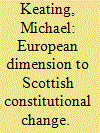

|
|
|
|
|
| Summary/Abstract |
Scottish self-government and European integration are linked. Europe has become an important framework for the independence project. Evidence for Scots being more pro-European is ambivalent, but there is a pro-European consensus in Scottish political parties and civil society. In the referendum campaign, the No side suggested that an independent Scotland might not gain admission to the European Union. If the United Kingdom as a whole should vote to withdraw from the EU in a future referendum but Scotland to stay in, the independence question would re-emerge. In the absence of independence, a number of issues arise as to how Scottish interests can best be represented in the EU.
|
|
|
|
|
|
|
|
|
|
|
|
|
|
|
|
| 16 |
ID:
134092
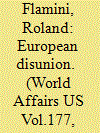

|
|
|
|
|
| Publication |
2014.
|
| Summary/Abstract |
Screaming their defiant war cries, Scottish clansmen pointed their long spears and prepared to meet the English charge. The two armies came together in bloody combat, the helmeted English knights, slowed by their cumbersome armor, outmaneuvered by the more agile, more lightly armed Scots, and eventually overwhelmed. When the English drew back, leaving hundreds of dead and wounded on the field, the screaming clansmen charged, turning the enemy's disciplined retreat into a rout.
|
|
|
|
|
|
|
|
|
|
|
|
|
|
|
|
| 17 |
ID:
118226
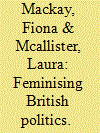

|
|
|
|
|
| Publication |
2012.
|
| Summary/Abstract |
Modest levels of female representation at the House of Commons are in sharp contrast to the Nordic-levels of representation achieved in the Scottish Parliament and the National Assembly for Wales since devolution in 1999. One apparent advantage of devolution is the opportunity that it provides for lesson-learning across jurisdictions. This article offers six lessons on women's political representation-three positive and three negative-drawn from the experience of devolution in Scotland and Wales. We draw conclusions from these lessons, including the need to keep parties under scrutiny to ensure they deliver on their rhetorical commitments. We also postulate that gender equality might prove too important to be left to political parties and consider whether there is a need to consider stronger measures such as mandatory quotas.
|
|
|
|
|
|
|
|
|
|
|
|
|
|
|
|
| 18 |
ID:
131635
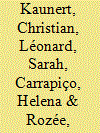

|
|
|
|
|
| Publication |
2014.
|
| Summary/Abstract |
This article examines how the governance of justice and internal security in Scotland could be affected by the outcome of the Scottish independence referendum in September 2014. The article argues that it is currently impossible to equate a specific result in the referendum with a given outcome for the governance of justice and internal security in Scotland. This is because of the complexities of the current arrangements in that policy area and the existence of several changes that presently affect them and are outside the control of the government and of the people of Scotland. This article also identifies an important paradox. In the policy domain of justice and internal security, a 'no' vote could, in a specific set of circumstances, actually lead to more changes than a victory of the 'yes' camp.
|
|
|
|
|
|
|
|
|
|
|
|
|
|
|
|
| 19 |
ID:
103552
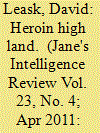

|
|
|
| 20 |
ID:
166566


|
|
|
|
|
| Summary/Abstract |
Interdisciplinary energy research is essential. It advances our understanding of potential transitions from high to low carbon energy systems. However, it is easier to propose than deliver. It requires translation into a simpler language, to aid communication, but not at the expense of the conceptual language that drives our understanding of complex energy systems. We combine legal, political science, and policy studies to show how to balance the need to communicate accessibly and recognise legal and policymaking complexity. We begin with a statement so accepted in legal studies that it has become a truism: the law in the books is not the same as the law in action. The allocation of legal competences is only one influence on policymaking in a complex system. We describe three key ways to conceptualise this relationship between law, policy, and energy systems, focusing on the: (1) ‘on paper’ legal separation of powers between different governments, (2) interaction between law and policy in practice, including blurry boundaries between formal responsibility and informal influence, and (3) role of law as one of many contributors to policymaking. We use these approaches to explain the implications of Brexit for UK energy policy.
|
|
|
|
|
|
|
|
|
|
|
|
|
|
|
|
|
|
|
|
|